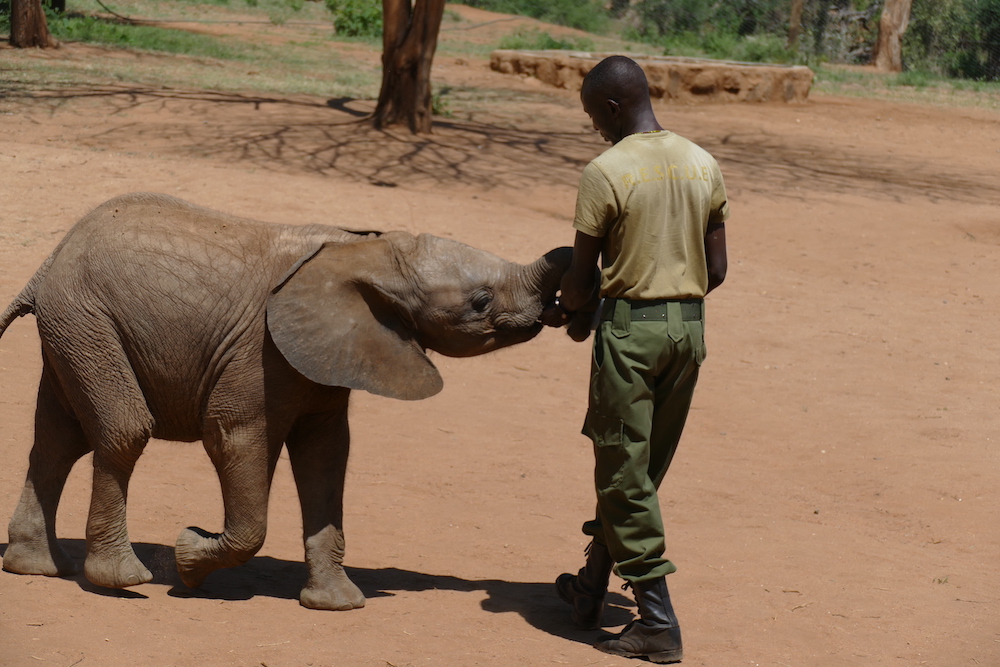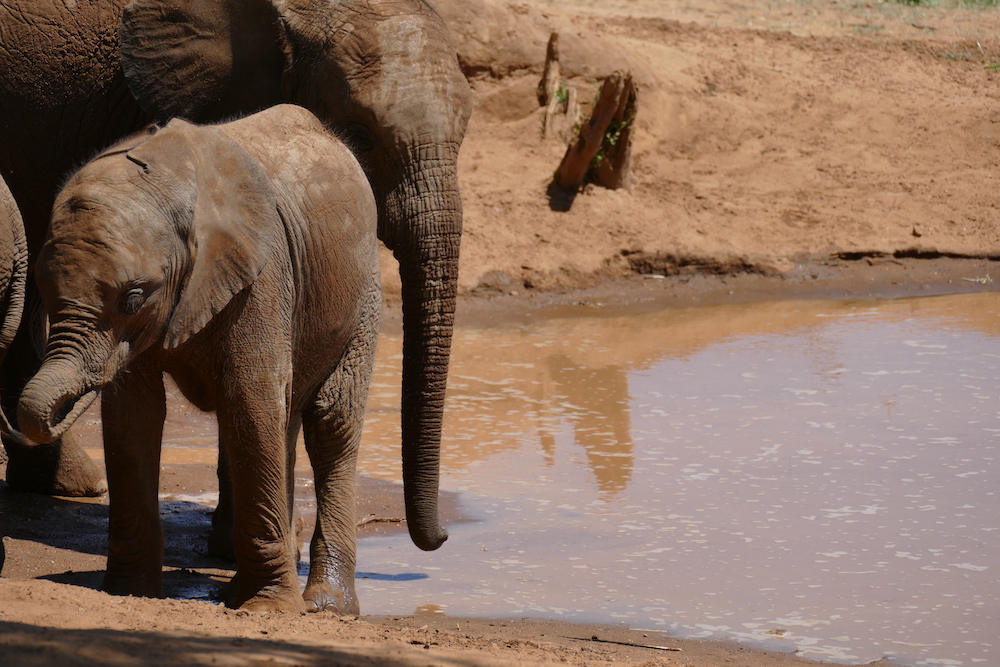Kids’ Corner:
Reteti Elephant Sanctuary
Have you ever heard the saying “Elephants never forget”? Well, their memories are only one of the many incredible things about elephants. Elephants are also considered the third most intelligent animals on the planet, behind humans and the great apes, and are also some of the most caring, loyal parents in the animal kingdom. Elephants form deep family bonds and live in tight matriarchal family groups of related females called a herd. The herd is led by the oldest and often largest female in the herd, called a matriarch. Herds have 8-100 but could be more. When a calf is born, it is raised and protected by the entire herd. Males leave the herd between the ages of 12-15 and may lead solitary lives or live temporarily with other males in bachelor herds. African elephants live an average of 60-70 years in the wild, and there are currently about 352,270 wild elephants living in 18 African countries.
Another elephant superpower: they can smell water, and this, along with their fantastic memory, helps them survive the yearly dry season. Unfortunately, this water-seeking behavior can also cause them problems, especially where humans are concerned. In Samburu County, Kenya, tribes of local herdsman (also known as the Samburu) dig deep wells, called singing wells in honor of the songs they sing as they haul buckets of fresh water from the bottom to the surface. These wells can get as deep as 7 meters (over 20 feet), and sadly, baby elephants frequently fall into these holes. Unable to retrieve them, the herd will only reluctantly leave the babies stranded. This used to result in the needless deaths of many baby elephants, but not anymore.
Since the Reteti Elephant Sanctuary was founded in 2016, orphaned and abandoned baby elephants have a new chance for life in the wild. Reteti is dedicated to orphaned elephants, whether from poaching, abandonment, human-wildlife conflict, or anything else. They have over a dozen elephants, who all need 24/7 care. They are fed every 3 hours around the clock with giant bottles of “elephant baby formula,” a mixture of human baby formula plus supplements and micronutrients that give them a balanced diet in addition to the leaves and grass they forage in the wild. Their loving, dedicated keepers sometimes even sleep with the elephants, building a relationship with them that helps them survive their infancy while setting them up for re-wilding when they’re able.
The baby elephants create a small herd together, similar in dynamics to the families they came from. The matriarch of the Reteti herd is a 2-year-old female named Shaba. She was rescued from the Shaba National Reserve, after poachers killed her mother. Shaba was thoroughly traumatized, as one might expect. Day and night, Reteti’s keepers tried to win her over by singing, talking, and offering her a variety of foods until finally, she accepted a bottle. She now loves her keepers, and her foster brothers and sisters, who look up to her and learn from her. And although she is now strong enough for release, for now, she stays right where she is so that she is able to train a new matriarch to take her place.
Reteti is not only is improving the lives of the elephants it rescues, but also that of the local Samburu workers. Kenya has a very high unemployment rate, so the sanctuary is sure to only hire locals, who are grateful for the steady paycheck, which then ripples out as they support their families and the larger community. Reteti currently employs about 35 keepers, 5 of whom are women.
This is especially notable because traditionally in Samburu society, women generally do not work outside the home. They are often married as young as 15 to men a decade or more older than they are, and start having children immediately, perpetuating the cycle. Reteti’s female keepers are given the opportunity to become independent, and to carve their own paths. They are given the support and resources which many of us take for granted. One of the female keepers, Dorothy Lowuekuduk says “Nothing is difficult. Anything a man can do, a woman can do better.” These women are some of the first women keepers in all of Kenya!
In addition to helping the Samburu people financially, Reteti has helped them realize the economic benefits of a strong elephant population. Before Reteti, the Samburu people viewed the elephant as a major annoyance: when baby elephants fell into the wells and died, they could no longer use the wells and would have to dig new ones. When Katie Rowe, one of Reteti’s founders, pitched the idea to the locals, she explained how a strong elephant population would bring tourism, money, and would save the wildlife they had grown up with.
In the three years since Reteti opened, the Samburu have not only come to love these beautiful creatures, thanks to their vigilance and protection, elephant poaching in Samburu County has all but disappeared. And best of all, with help from donors around the world, Reteti is expanding! Read more about Reteti on their website, https://retetielephants.org, or better yet, next time you’re in Kenya, go visit them yourself!














